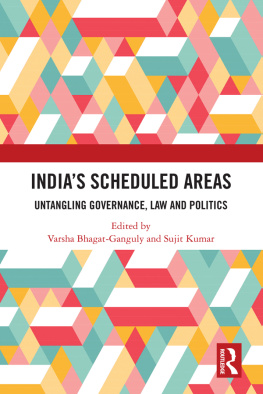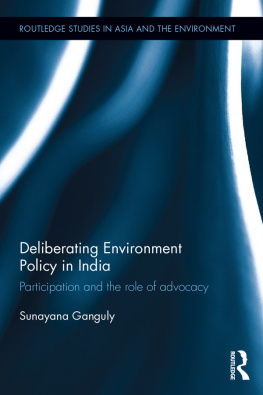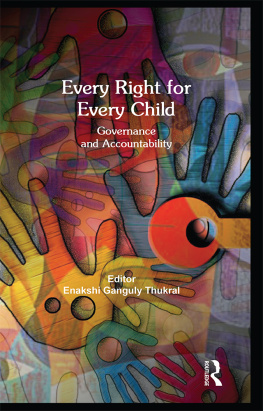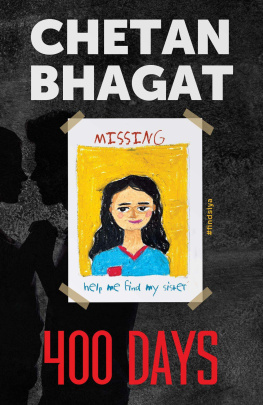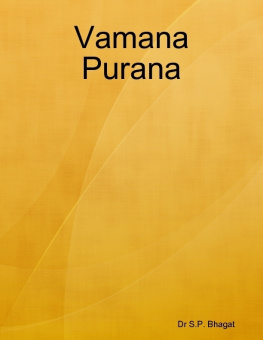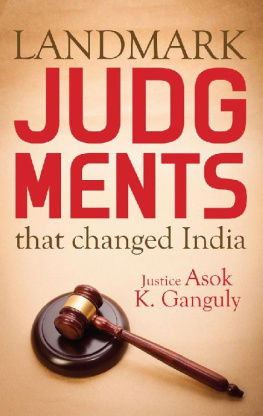Indias Scheduled Areas
This volume explores the complexities of governance, law, and politics in Indias Scheduled Areas. The Scheduled Areas (SAs) are those parts of the country which have been identified by the Fifth and Sixth Schedule of the Constitution of India and are inhabited predominantly by tribal communities or Scheduled Tribes. SAs are often identified by their geographical isolation, primitive economies, and relatively egalitarian and closely knit society. Irrespective of the constitutional provision for governance and a mandate of devolution of power in terms of funds, functions, and functionaries, the backwardness of these areas have remained a challenge.
This volume attempts to explore the reasons behind the disregard for legal and institutional mechanism designed for the SAs. It examines the role of the state in the neoliberal era on fund allocation and utilisation, the governance of land and forest resources, and the ineffectiveness of the existing administrative structures and processes. It also looks into the interpretations of law by the judiciary while dealing with community rights vis--vis the states prerogative of bringing development to the regions, and how development concerns are addressed in the name of good governance by various stakeholders.
Comprehensive and topical, this volume will be useful for scholars and researchers of political studies, development studies, developmental economics, sociology and social anthropology, and for policy makers.
Varsha Bhagat-Ganguly is former Professor at the Centre for Rural Studies, LBSNAA, Mussorie and the Nirma University, Ahmedabad, India. As fellow of Indian Institute of Advance Study, Shimla, she researched on protest movements in Gujarat. She has worked as a researcher, an academician, and a development practitioner; her areas of interest include the land question, collective action for social justice, research methodology, and Gujarat. Of 14 publications, the recent ones are on protest movements in Gujarat (2015), land rights in India (2016, 2018), and on land titling in India (2017). Her forthcoming publications are on the land question in neoliberal India and e-waste management in India. She has also edited and contributed to various academic journals of repute.
Sujit Kumar is affiliated with St. Josephs College, Department of Political Science, Bengaluru, India. His areas of research interest include Adivasi politics, political economy, political thought, and Indian politics. He has studied the different aspects of Adivasi society, particularly in context of land acquisition. He has published articles in journals like Studies in Indian Politics, Studies in Humanities and Social Sciences, Economic and Political Weekly, Seminar, and Journal of Adivasi and Indigenous Studies.
First published 2020
by Routledge
2 Park Square, Milton Park, Abingdon, Oxon OX14 4RN
and by Routledge
52 Vanderbilt Avenue, New York, NY 10017
Routledge is an imprint of the Taylor & Francis Group, an informa business
2020 selection and editorial matter, Varsha Bhagat-Ganguly and Sujit Kumar; individual chapters, the contributors
The right of Varsha Bhagat-Ganguly and Sujit Kumar to be identified as the authors of the editorial material, and of the authors for their individual chapters, has been asserted in accordance with sections 77 and 78 of the Copyright, Designs and Patents Act 1988.
All rights reserved. No part of this book may be reprinted or reproduced or utilised in any form or by any electronic, mechanical, or other means, now known or hereafter invented, including photocopying and recording, or in any information storage or retrieval system, without permission in writing from the publishers.
Trademark notice: Product or corporate names may be trademarks or registered trademarks, and are used only for identification and explanation without intent to infringe.
British Library Cataloguing-in-Publication Data
A catalogue record for this book is available from the British Library
Library of Congress Cataloging-in-Publication Data
A catalog record for this book has been requested
ISBN: 978-1-138-58372-6 (hbk)
ISBN: 978-0-429-28541-7 (ebk)
Typeset in Sabon
by Apex CoVantage, LLC
To all the inhabitants of Indias Scheduled Areas and their well-being
Contents
VIRGINIUS XAXA
VARSHA BHAGAT-GANGULY AND SUJIT KUMAR
PART I
Governmentality: a neoliberal perspective on governance
ASOKA KUMAR SEN
VARSHA BHAGAT-GANGULY AND BHANU SHREE JAIN
SUMARBIN UMDOR
CHANDRA BHUSHAN KUMAR AND SONALI GHOSH
PART II
Rights, legalism, and politics
SIDDHARTH SAREEN AND EMMA JANE LORD
SUJIT KUMAR
SHOMONA KHANNA
RICHARD HEMRAJ TOPPO
ANJANA SINGH
Guide
Chandra Bhushan Kumar is an Indian Administrative Service officer with 23 years of working in areas of public policy and governance. As a district administrator, he served in the tribal-dominated areas of Arunachal Pradesh and Andaman and Nicobar Islands wherein specific insights on administering scheduled areas were acquired. A Mathematics and Law graduate, he also has a Masters in Public Policy from Syracuse University and completed his PhD in Human Geography from Aberystwyth University, United Kingdom, wherein he examined the water governance issues of Delhi megacity. He is currently serving as Deputy Election Commissioner at Election Commission of India.
Sonali Ghosh is an Indian Forest Service officer with 18 years of work experience in the field of forest and wildlife conservation in India. As part of her job, she has worked as a field manager in countrys finest Protected Areas such as Kaziranga and Manas. She has travelled extensively and written about forest and peoples livelihood issues in northeast India. She holds a dual masters degree in Wildlife Science and Forestry and a PhD degree in Geography from Aberystwyth University, United Kingdom. A WWF-PATA Bagh Mitra awardee, she has also served as a Scientist (on secondment) at the UNESCO Category 2 Centre on World Natural Heritage Management and Training for Asia and the Pacific Region at Wild-life Institute of India, Dehradun. She is currently serving as the Director of the Swachh Bharat Mission at the Government of India.
Richard Hemraj Toppo is a PhD student at the International Institute of Social Studies, The Hague. His research focuses on the Adivasi groups interaction with the state and the Maoists in Jharkhand, towards realising their (Adivasi) rights and demands. The research aims to understand the processes of social movement when situated within the context of conflict.
Emma Jane Lord is a PhD candidate at the Centre for the Study of the Sciences and the Humanities, University of Bergen, Norway. She holds a BSc in Environmental Science and an MSc in Sustainable Tropical Forestry, through the Erasmus Mundus scholarship programme Sutrofor, and was formerly a visiting researcher at Universitat Autonoma de Barcelona. She has carried out inductive research in Tanzania and Colombia, and now conducts policy analysis of Landscape Centred REDD+; reducing emissions from deforestation and forest degradation. She focuses on how this complex policy utilises global concerns of deforestation and food security to justify neoliberal agendas, with decontextualised economic logic and pseudo-scientific rationalities of agricultural intensification justifying the intertwining of private interests with globalised research institutes and governments.

